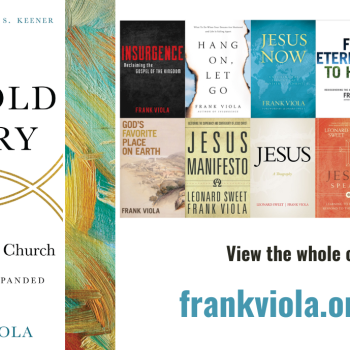Parker and Stone's play marks an already existing division in the United States. Most of us identify with a religion, yet there are a significant number of thought-leaders—the playwrights, comics, politicians, and professors I mentioned, as well as others—for whom religion is simply nonsense. How should a religious person respond to that division? How do we show that our "goofy stories" are more than that, that the connection between our stories and beliefs and our niceness is intimate? How do we demonstrate that our beliefs and our actions are of a piece?
Crying foul when we are misportrayed won't work. Doing so feeds into the larger secularist narrative about religious people: we don't get it; we don't understand that our beliefs are goofy and irrelevant.
Nor will trying to force change through political action. James Davidson Hunter (To Change the World: The Irony, Tragedy & Possibility of Christianity in the Late Modern World) has cogently argued against that option. James K. A. Smith sums up the reason that politics is not the answer: "The Church does not have a cultural critique [of the world]; it is a cultural critique"(Introducing Radical Orthodoxy: Mapping a Post-Secular Theology, p. 80).
"The Book of Mormon" may not revile us (I can't be sure since I've not seen it). Whatever "The Book of Mormon" does, it isn't persecution (thank goodness). But we can take comfort by analogy in the beatitude, "Blessed are ye, when men shall revile you, and persecute you, and shall say all manner of evil against you falsely, for my sake" (Mt. 5:11).
That comfort ought not to be the false comfort of patting ourselves on the back because persecution or mockery is a sign of our blessedness. Sanctimoniousness isn't helpful. Instead, it should be the comfort of knowing that our light can shine in our good works (Mt. 5:16) even if we are not understood or believed. We must be a cultural critique. As Hunter points out (To Change the World, pp. 276-77), the sweetest "revenge" for religious people would be to "seek the peace and prosperity of the city to which I have carried you" (Jer. 29:7).
I'm not holding my breath for Parker or Stone to get religion, whether Mormonism or something else. Neither am I holding my breath for it to become politically incorrect to mock religion. But if religious people are going to do something about how religion is perceived and portrayed on television and Broadway and in some political and academic discourse, it will only be by taking Hunter's advice. Being nice is the beginning of an answer. Being a blessing to society is the fuller answer.
We may not be able to convince those who think our stories are goofy that they are wrong, but we must continue to give them pause. We need to make them continue to wonder how people with such goofy stories can be so nice. More important, we need to make them wonder how our lives can be such a blessing to others. Of course, that requires that we become that blessing.





